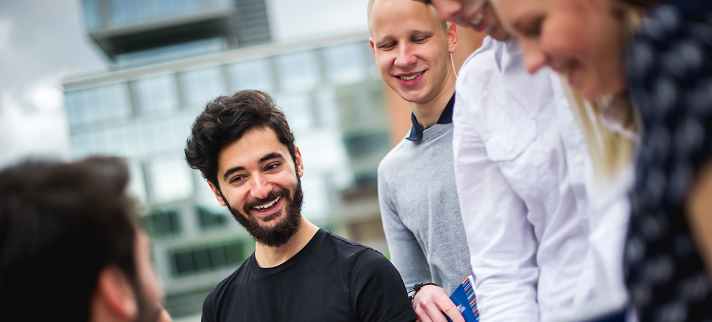Home
For international students
Professor of ETH Zurich University – about “Trauma Biomechanics and rehabilitation technologies”
- Programmes in English 2025/2026
- Admission 2025/2026 Scholarships
- For exchange students
- Free Movers
- Transfer studies
- Erasmus+ studies and traineeships
- Mentor programme
- Student testimonials
- Accommodation
- Career Services
- Medical Care
- Immigration Regulations
- Leisure and Student Activities
- Useful information
- VILNIUS TECH for Creators of Tomorrow
- Mental and spiritual support
- Representatives Abroad
- Contacts
- Computer Engineering

2016-03-16
Professor of ETH Zurich University – about “Trauma Biomechanics and rehabilitation technologies”
Information about lectures
40 hours course on “Trauma Biomechanics and rehabilitation technologies”
Target auditorium – I, II and III study cycle students from biomechanics, mechanical engineering and transport engineering.
Lectures – fundamental theory, concepts, knowledge
Exercise – focus on practical aspects of knowledge application
Seminar – exchange of information and discussions about topics of interests
Schedule of the lectures
|
Day
|
Topic
|
Type
|
Hours
|
Date and time
|
Room
|
|
Basic knowledge
|
|||||
|
1
|
Introduction / Injury models and failure of biological tissue
|
Lecture
|
2
|
2016.03.14
1020-1155
|
MR-II,
2-107
|
|
Analysing (sports, traffic) accidents
|
Exercise
|
2
|
2016.03.14
1210-1345
|
MR-II,
2-107
|
|
|
2
|
Head injury
|
Lecture
|
2
|
2016.03.15
1020-1155
|
MR-II,
2-206
|
|
Sports helmets
|
Exercise
|
2
|
2016.03.15
1210-1345
|
MR-II,
2-206
|
|
|
3
|
Injury to the upper and lower extremities
|
Lecture
|
2
|
2016.03.16
1020-1155
|
MR-II,
2-107
|
|
Experiments in trauma biomechanics
|
Exercise
|
2
|
2016.03.16
1210-1345
|
MR-I,
1-109
|
|
|
4
|
Excursion to Rehab Hospital
|
|
|
2016.03.17
800-1200
|
Santariškių klinikos
|
|
Principles and applications in rehabilitation (Discussion of today’s visit)
|
Exercise
|
4
|
2016.03.17
1620-1945
|
MR-II,
2-107
|
|
|
5
|
Trauma to the spine and thorax
|
Lecture
|
2
|
2016.03.18
1210-1345
|
MR-II,
2-107
|
|
Injury prevention in sports
|
Exercise
|
2
|
2016.03.18
1430-1605
|
MR-II,
2-107
|
|
|
Special topics in trauma biomechanics
|
|||||
|
6
|
Computer simulations
|
Lecture
|
2
|
2016.03.21
1020-1155
|
MR-II,
2-107
|
|
Student project
|
Exercise
|
2
|
2016.03.21
1210-1345
|
MR-II,
2-107
|
|
|
7
|
Occupant protection
|
Lecture
|
2
|
2016.03.22
1020-1155
|
MR-IV,
1-213
|
|
Student project
|
Exercise
|
2
|
2016.03.22
1210-1345
|
MR-IV,
1-213
|
|
|
8
|
Pedestrian Impact
|
Lecture
|
2
|
2016.03.23
1020-1155
|
MR-II,
2-214
|
|
Student project
|
Exercise
|
2
|
2016.03.23
1210-1345
|
MR-II,
2-206
|
|
|
9
|
Exam
|
Lecture
|
1
|
2016.03.24
830-915
|
MR-II,
2-107
|
|
Student competition
|
Exercise
|
3
|
2016.03.24
920-1155
|
MR-II,
2-107
|
|
|
10
|
Trauma in children and elderly
|
Lecture
|
2
|
2016.03.25
830-1005
|
MR-II,
2-107
|
|
Summary /Wrap-up and final discussion
|
Lecture
|
2
|
2016.03.25
1020-1155
|
MR-II,
2-107
|
|
|
|
|
Total:
|
40
|
|
|
Trauma biomechanics and rehabilitation technologies
According to the statistics in Lithuania, the number of registered traffic accidents decreased almost 6.5 times (9.8 in 1980 and 1.5 in 2013), however the number of injured remained almost the same – for a 100 thousand people there was 137.6 injured in 1980 and 134.6 in 2013 (www.lakd.lt). Injuries, related to traffic accidents can be of different outcomes – from mild to severe, when person becomes disabled permanently. Active person can sustain injuries during sport activities or in work placement. Trauma biomechanics is important scientific field, which explores biomechanics of various injuries, i.e. what are trauma mechanisms and causes. This knowledge is important for design of safe transportation means, developing and designing safe training equipment and rehabilitation devices, assistive technologies for disabled. Research in trauma biomechanics requires broad knowledge and understanding in biomechanics, mechanics and application of different technologies (computer simulation and experiments). Students will understand importance of various technologies and approaches, will obtain better understanding of general biomechanics principles and their application.
Dr. Kai-Uwe Schmitt is professor of Zurich University and Swiss Federal Institute of Technology, researcher at Institute of Biomedical Engineering, council member and secretary of the International Research Council on Biomechanics of Injury (IRCOBI), member of advisory board on traffic safety at Swiss Federal Road Office, partner/board member and senior researcher at Working Group on Accident Mechanics (AGU Zurich).













